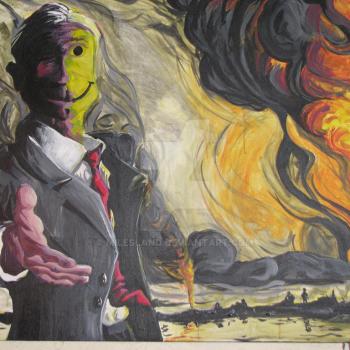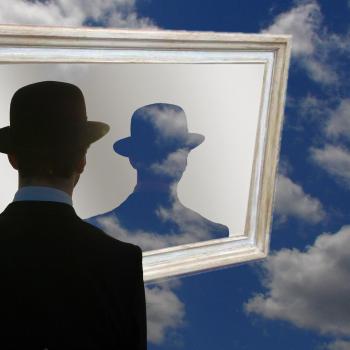
From where I sit, there appears to be two different political philosophies or agendas guiding the United States. The first embraces a concern for the common good, and flowing from that concern, engages social justice with the desire to lift everyone up, promoting the dignity of all persons, no matter the differences which one can find between them (race, sex, religion, cultural background, et. al); what gets in the way of the common good, what gets in the way of the dignity of the human person, is seen as unjust, and so denounced by those who work for and promote the common good. The other political agenda is found in and with the so-called “culture war.” Here, the concerns are much more private – people vote against what they see as different, or degenerate, that is, what offends them and their own individual desires and sentiments, sentiments which they believe are superior and so should be enforced with the rule of law. What differences are seen as important, and which are superior and which are inferior, might not always be something those concerned with the culture war will agree about, but they agree in principle that they must seek what is deemed superior and prop it up, giving it power and authority to guide and direct society. The culture war agenda is one which is unconcerned about social justice or the dignity of the human person; those who follow it criticize those who seek for the common good because they believe such a promotion of the common good undermines the social order and hierarchy which they think should be represented by society (that is, it will undermine those believed to be superior by having inferiors treated as their equals). Nonetheless, those engaging the culture war agenda might, in some fashion, claim to promote the common good, but to them, the common good is found when that which they deem superior is given power and authority to create a society which represents their ideal cultural landscape.
The culture war agenda typically leads to an authoritarian approach to society, because those following it want to create laws which reinforce their likes and interests, and then demand everyone to follow those laws, whether or not the laws are just; what they mean “law and order” is the establishment of their preferential order in society through the use of strict laws, even if the creation and enforcement of those laws can be shown to harm innocents because they think the social order is more important than the persons involved. Those concerned about the common good, while they also believe the rule of law is important, see it as a relative good; they believe that the law should serve the people, not the people the law, and if laws are made which undermine human dignity and hurt innocent people, they say human dignity and rights should override such laws because those laws are unjust and unjust laws should have no power or authority to cause such harm (“an unjust law is no law”).
While the two political philosophers can be said to be rivals, the average person tends to mix them together in a variety of ways in their own personal outlook. They come, as it were, in shades or degrees, those most people tend to lean towards one over the other for their own political activism. Currently in the United States, those who are called “liberals” tend to look for and promote the common good, while those who are “conservative” tend to be interested in the culture war, looking to preserve their preferential cultural mores, whether or not they are just. There are a variety of ways both sides engage their issues, that is, there are internal debates concerning how best to implement their goals, or even, what those goals should look like, but each side tends to agree with the basic foundations of the debate and how they should go about promoting their concerns.
For Christians, Scripture and the Christian tradition has long suggested the emphasis should be on the common good, and the need for social justice. From the Exodus, to the witness of the prophets, to Christ’s Sermon on the Mount or the way Christ engaged legalists who judged and condemned people unjustly, not only do we find the common good promoted, we see that God constantly worked to protect, support, and liberate those whose human dignity had been undermined by those with power; the realization of this truth is what led to the declaration of the “preferential option for the poor” in modern times. This is not to say Christians should be unconcerned with sin, for obviously, sin is a problem, a fundamental problem, but not all sin is the same. Some sins are of far greater weight than others, and those who are governing society should be concerned about grave sins which undermine the common good and the dignity of those living in their society. Those sins which come together to form systemic structures of sin are those which must be fought against by society as a whole. Personal sins, such as various weaknesses in the flesh, so to speak, must also be fought, but on a personal basis, not a social or cultural one. Sadly, over the years, Christians have lost sight of this and have come to follow the ways of Jesus’ critics, seeking to create systems of control, systems set to undermine the dignity of some by calling them and their ways inferior, using external qualities (such as race or sex) or those personal sins they do not like (usually sexual in nature) as a way to determine who is inferior and should be forced to change by the rule of law. Sts. Augustine and Aquinas long ago noted the error of such thinking when they suggested prostitution, which they did not agree with, should not be repressed by the state because such repression leads to the undermining of freedom and the common good. That is, they saw the attempt to control people by legal force, by the rule of law, even if it is done to deny some evil, some sin, often creates a far greater evil than the evil which the law tries to control.
Christ shows us God loves the world, and seeks to bring salvation to all instead of judging and condemning the people in it. Christ resisted judging sinners, not because he denied the problem of sin, but because he understood the way to overcome sin was with mercy, grace, and by helping the people caught in its clutches find and engage their own natural goodness. He also understood that those who were being judged and condemned by those in positions of power (secular or religious) tended to be condemned for private sins with far less gravity associated with them than the sins of those who were condemning them. This is because such authorities would judge the sins of others as a form of deflection, trying to hide the structures of sin which undermined the common good and the way they privately benefited from those structures. Culture war concerns, because they avoid the common good, and with it, concerns of social justice, tends to embrace such deflections to this day, because culture war concerns want to preserve some element of the status quo, including the injustices which remain in society. This is why those acting upon those concerns tend to use the petty sins of others, especially their critics, to denounce them, hoping that by doing so, they can undermine the ability of their critics to bring about change in society. The more I reflect upon how Christ acted, the more I reflect upon the nature of the kingdom of God, the more I found myself resisting such pettiness. Of course, this is not to say I am not influenced by it, for, as I said, most people seem to have a mixture of both perspectives influencing them and how they think, and my religious background itself was heavily influenced by the culture war perspective (being a former Southern Baptist). Thankfully, it was not the only influence I had when I was growing up. My father often worked for and promoted justice, seeking to help people who he believed were being unjustly treated or abused by the system, whether or not he agreed with them and their private lives (some he did, some he did not). In doing this, he showed me the pursuit for justice was important. While I would later take up that foundation and develop it with my own theological and philosophical explorations, going in directions he did not go, I see how much he inspired me by his examples and helped point me in the right direction.
*Personal Reflections And Speculations
Stay in touch! Like A Little Bit of Nothing on Facebook.
If you liked what you read, please consider sharing it with your friends and family!
N.B.: While I read comments to moderate them, I rarely respond to them. If I don’t respond to your comment directly, don’t assume I am unthankful for it. I appreciate it. But I want readers to feel free to ask questions, and hopefully, dialogue with each other. I have shared what I wanted to say, though some responses will get a brief reply by me, or, if I find it interesting and something I can engage fully, as the foundation for another post. I have had many posts inspired or improved upon thanks to my readers.

















